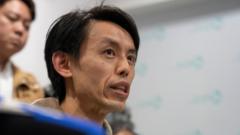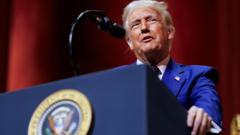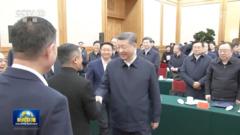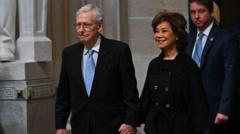In recent years, Germany has experienced a significant political shift, primarily characterized by the rising influence of the far-right nationalist party, the Alternative for Germany (AfD). This party, often labeled as "radical," "racist," and "anti-democratic" by its detractors, is poised to potentially become Germany's second largest political force following the elections this Sunday. The predicted success of the AfD indicates a seismic change not only within Germany but across Europe, as populist sentiments rise throughout the continent.
**Germany's Political Landscape Shifts: The Rise of the AfD and Its Implications**

**Germany's Political Landscape Shifts: The Rise of the AfD and Its Implications**
As the Alternative for Germany (AfD) commands attention ahead of the federal elections, concerns mount over the party's alarming ideals and its potential impact on German unity and the European political scene.
The AfD's core messages resonate strongly with a consistent base of voters. It shares a similar "anti-woke," tough-on-migration stance seen in other contemporary populist movements, mirroring sentiments expressed by figures like former U.S. President Donald Trump. The AfD's rhetoric includes calls to halt military aid to Ukraine and pursue closer ties with Russia, a position that diverges sharply from the predominant pro-Ukrainian stance held by most political factions in Germany.
Germany, as Europe's largest economy with a tumultuous history, is seen as particularly sensitive to the interest of extremist political movements. Traditionally, its past has provided a layer of protection against hard-right ideologies gaining traction. However, the growing support for the AfD suggests shifting perceptions about the country's identity amidst a backdrop of economic stagnation and declining international standing.
Many Germans have witnessed their nation struggle under the weight of its aging infrastructure and reliance on industries such as automotive manufacturing that are perceived as outdated. Infrastructure failures, like the collapse of bridges and erratic train services, have brought the spotlight on the shortcomings of the German economic model. Political leaders have grappled with the constraints imposed by Germany's fiscal discipline rules, which many accuse of stifling necessary investment in innovation and growth.
The military's degradation is also noteworthy. Chancellor Olaf Scholz’s promises for reform have not yet translated into a fully equipped military, drawing ire from allies who expect Germany to take on a more steadfast role within NATO. The AfD's proposal of focusing resources on bolstering domestic security rather than foreign military engagements requires scrutiny, as it reflects a polarized approach to national defense and international responsibilities.
Migration has emerged as a critical issue impacting voter sentiment. Having accepted significant numbers of refugees during previous crises, public perception regarding immigration has grown contentious, particularly after a series of violent incidents linked to asylum seekers. The AfD’s strong anti-immigration stance garners support among those who feel threatened by this newfound diversity, though they insist they welcome lawful migrants. A court ruling earlier this year further complicated perceptions of the AfD, concluding their vision of nationality posed a legally concerning ideology.
As the elections approach, the mainstream political parties have begun adopting language and policies that echo AfD sentiments, though the far-right remains unlikely to enter a coalition government immediately. Observers point to the enduring mechanism of coalition politics that historically prevents singular dominance by any one party, particularly one associated with far-right extremism.
Though the AfD rallies support from a wider demographic, including younger voters, the majority of the German population remains vigilant against a resurgence of fascist ideologies. The upcoming election results will likely shape Germany's political landscape for years to come, and as political analysts speculate on the far-right’s future, they stress the importance of defending democratic ideals in the face of extremism.
Germany, as Europe's largest economy with a tumultuous history, is seen as particularly sensitive to the interest of extremist political movements. Traditionally, its past has provided a layer of protection against hard-right ideologies gaining traction. However, the growing support for the AfD suggests shifting perceptions about the country's identity amidst a backdrop of economic stagnation and declining international standing.
Many Germans have witnessed their nation struggle under the weight of its aging infrastructure and reliance on industries such as automotive manufacturing that are perceived as outdated. Infrastructure failures, like the collapse of bridges and erratic train services, have brought the spotlight on the shortcomings of the German economic model. Political leaders have grappled with the constraints imposed by Germany's fiscal discipline rules, which many accuse of stifling necessary investment in innovation and growth.
The military's degradation is also noteworthy. Chancellor Olaf Scholz’s promises for reform have not yet translated into a fully equipped military, drawing ire from allies who expect Germany to take on a more steadfast role within NATO. The AfD's proposal of focusing resources on bolstering domestic security rather than foreign military engagements requires scrutiny, as it reflects a polarized approach to national defense and international responsibilities.
Migration has emerged as a critical issue impacting voter sentiment. Having accepted significant numbers of refugees during previous crises, public perception regarding immigration has grown contentious, particularly after a series of violent incidents linked to asylum seekers. The AfD’s strong anti-immigration stance garners support among those who feel threatened by this newfound diversity, though they insist they welcome lawful migrants. A court ruling earlier this year further complicated perceptions of the AfD, concluding their vision of nationality posed a legally concerning ideology.
As the elections approach, the mainstream political parties have begun adopting language and policies that echo AfD sentiments, though the far-right remains unlikely to enter a coalition government immediately. Observers point to the enduring mechanism of coalition politics that historically prevents singular dominance by any one party, particularly one associated with far-right extremism.
Though the AfD rallies support from a wider demographic, including younger voters, the majority of the German population remains vigilant against a resurgence of fascist ideologies. The upcoming election results will likely shape Germany's political landscape for years to come, and as political analysts speculate on the far-right’s future, they stress the importance of defending democratic ideals in the face of extremism.




















